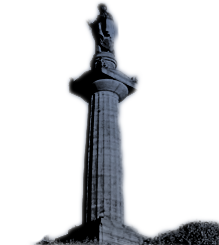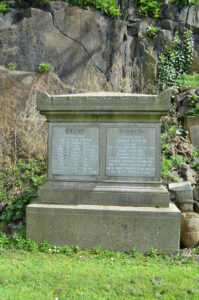James Brown Thomson and his brothers
The newspapers throw up some interesting stories about families buried in the Necropolis. The related Brown and Thomson families share a lair in compartment Gamma in the Necropolis.
THE STORY OF A GLASGOW MISER. A FORTUNE AND LIVING ON PORRIDGE
The Glasgow Evening News of Tuesday night says that under the will of the late Mr James B. Thomson, who died the previous day in Gartnavel Asylum, the charitable institutions of Glasgow and the West of Scotland are likely to benefit. Only a few months ago Mr James B. Thomson was living in seeming poverty in a small house near Paisley Road, and investigations as to how a man in this condition of life was able to leave £100, 000 to charitable objects have opened up a history for which it would be hard in these work-a-day times to find a parallel. The family history goes back to the early years of the century, when three boys—John, James, and Thomas Thomson—were reared in humble circumstances in a house in Rottenrow. In the course of time John went into business in the city, and became in time an underwriter and a well-known figure in the Royal Exchange.
He was for many years in partnership with Mr Watson, the late City Chamberlain, and he controlled a very prosperous business. His most successful speculation, and the one which laid the foundation of the fortune which now awaits distribution, was the purchase of some property at Stobcross. In the course of time, when the docks came to be formed there, this ground increased enormously in value, and was sold to the Clyde Trust. Thomas, another of the brothers, had meanwhile gone abroad and established a large and successful trading business in Valparaiso. The third brother, James, who died on Sunday, remained in Glasgow, but his affairs went less successfully, and he worked most of his life about the docks, becoming a stevedore in a small way of business. A number of years ago Thomas returned from Valparaiso, and being unmarried, took up house with John, who was also a bachelor.
They occupied a mansion-house in the West End of the city, and their combined fortunes at this time ran to about £30,000 (sic). The two brothers made a compact then that when one of them died half of their combined possessions, about £150,000, should go to their maternal relations, whose name was Brown, and that the survivor should take the remaining £150,000. About eight or ten years ago Thomas died [7 September 1887], and under his will this agreement was carried out, and three relations of the name of Brown got each £50,000. Very soon after John also died [25 October 1887] rather suddenly, and, as he left no will, his money passed to his brother James as heir-at-law, though the other brothers had not recognised him for many years.
James was, like the others, well advanced in years at this time, and lived in Smith Street, Kinning Park. The money was made over to him, and he took possession at the same time of the house which his brothers had occupied. He went there and lived for about a week, at the end of which be left, saying it was far too expensive for him, and returned to his room and kitchen at 27 Smith Street. He had always been a little peculiar in his ways, and as the years went on his peculiarity became more marked. He shunned all society, and lived a solitary life, attended only by an elderly woman, Mrs Stuart, who kept the house for him. About two years ago his housekeeper fell ill and was compelled to leave him. He refused to allow anyone else to wait on him, shut himself up in his house, and lived in the meanest possible way. He cooked hie own food, living principally on porridge, and of which he made sufficient at a time to last him for a day two. Some of the neighbours remonstrated with him that a man possessed of money should live in this fashion, but he justified himself by arguing that it was ” very economical.” A neighbour woman got in occasionally and attempted to keep his house in fairly decent order, but he became more and more suspicious, barricaded his door, and refused to allow any one to enter.
All last winter he lived shut up in his house without a spark of fire more than was necessary to cook his pittance of porridge. His sole recreation was to go to the Mitchell Library, to which he walked every day with the idea of saving car fares, and where he sat regularly every day. His affairs were meantime in the hands of a firm of Glasgow solicitors, but he drew from them only a few shillings a week and refused to allow them to make any other arrangements for him. Last spring be had become so queer in his behaviour, and his house bad become so offensive from long neglect, that the neighbours called the attention of the authorities to the case. A sanitary inspector visited the place and found the house in a very filthy condition. They had it cleared out, and as Thomson then seemed incapable of taking care of himself an attempt was made to get him into some institution in the city.
The Old Man’s Home was tried, but it was naturally considered that being possessed of means he was not a fitting candidate for admission. Every effort was made to induce him to remove or to allow someone to take care of him, but he stubbornly resisted. He had several hallucinations, one of them being that his brother Thomas, who had then been dead for nearly ten years, used to visit him every night. He had knocked a hole in the wall separating the room and kitchen beds, and he used to lie there and carry on imaginary conversations with his brother. The parochial authorities refused to take charge of the case, and at last he was certified as insane and removed to Gartnavel Asylum, where he remained until he died. It is stated that while be himself lived in such squalid surroundings his lawyers paid, by hie directions, charities amounting to about £600 per year. The terms of the will have not yet been made public, but it is stated that the total sum left amounts to about £180,000. There are, it is said, a number of legacies to private individuals ranging from £2000 downwards, and that £100,00 is set aside for public charities.
Elgin Courant, and Morayshire Advertiser – Friday 07 October 1898
The remains of Mr James B. THOMSON, concerning whose charitable bequests rumour has been busy for the past two days, were interred yesterday in the Glasgow Necropolis beside those of his brothers and other relatives. By his will Mr Thomson has, in addition to numerous and handsome personal bequests, left the following legacies to Glasgow institutions: Royal Infirmary, £4000; Western Infirmary, £3000; Victoria Infirmary, £2000 ; Sick Children’s Hospital, £200; Institution for Deaf and Dumb, £200; Asylum for the Blind. £200; Lock Hospital, £200; Seamen’s Friends Society, £200; Night Asylum for the Houseless, £200. Further, Mr Thomson directs his trustees to divide among such charitable, benevolent, or educational institutions in Glasgow or the West of Scotland, as they may themselves select, the residue of his estate, which, it is estimated, may, after paying all prior legacies and Government duties, amount to from £60,000 to £65.000.
The Dundee Courier & Argus (Dundee, Scotland), Thursday, October 06, 1898










